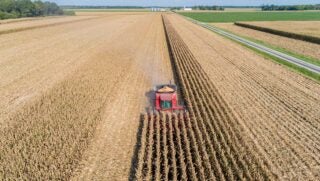Nick Offerman was a fan-favorite cast member of the NBC sitcom Parks and Recreation. His character’s gruff “I know more than you” demeanor was relatable, especially to those of us who work outdoors and with our hands. So, it’s fitting that he has been chosen by the Natural Resource Defense Council for a new soil campaign they’re doing.
Let’s get the ugly stuff out of the way: The NRDC hasn’t often been a friend to agricultural producers, particularly larger-scale farmers. The organization has long accused farmers of overusing crop protection products and of polluting waterways and the air. It also rails against GMOs and CAFOs and these days is hyper-focused on climate change.
So maybe that makes the partnership with Offerman all that much more curious … and interesting. Offerman comes from a farming family in Minooka, Illinois, and the NRDC is using him to promote a push toward using what it deems to be regenerative agriculture.
The new campaign is called Face Plant, and it’s pretty obvious from the start why that double entendre was chosen.
Playing the role of “soil” in the new video, Offerman says early on, “Generations of chemicals and tilling have left me spent and lifeless, dried out, flaky, like dust in the wind.”
Despite the effort to play off emotion and some misconceptions in the video, the message of using more cover crops to help build the biological health of soil is a worthwhile one.
Cover crops create healthy soil structure, reduce erosion and compaction, increase soil moisture and water filtration, sequester carbon, control weeds, and contribute to higher crop productivity, especially after three years. In general covers are widely believed to be a significant way to nurture the land’s agricultural legacy into the next generation.
Recent data shows that financial incentives play a major role in persuading farmers to adopt cover crops, yet the reason producers continue using cover crops go well beyond incentive programs.
Numbers from a recent Purdue University/CME Group Ag Economy Barometer report show that 45 percent of corn and soybean growers say they are currently using cover crops on their operations, and that percentage has been growing over the past decade.
So it’s possible to like the message and the messenger, even if you don’t tend to like the platform that hired them.


